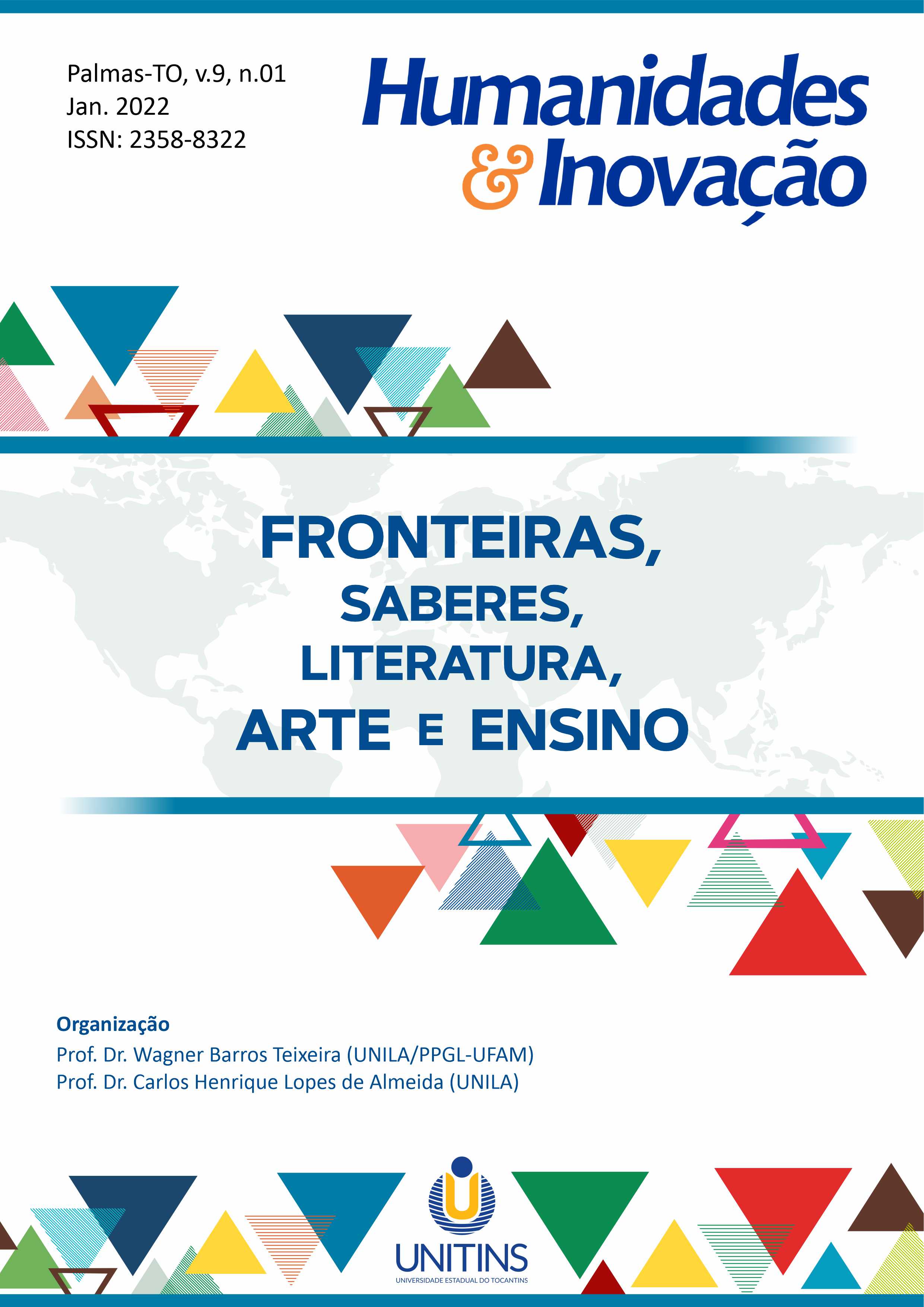TERRITÓRIOS LINGUÍSTICOS E PARADIGMA(S) CIENTÍFICO(S) GRAMATICAL(IS) QUE CONTEMPLEM A RELAÇÃO PARADOXAL ENTRE A NECESSIDADE DE UM PADRÃO E A REALIDADE LINGUÍSTICA MUTÁVEL
Abstract
In this article, we corroborate the contacts between linguistic territories, especially those that bypass the Portuguese language, characterizing it as multi-territorial, and about the power relations that permeate the social dynamics of these territories, making the intentions and objectives of their actions converge. As a theoretical basis, we share the propositions of Deleuze, Guattari, Zourabichvili, Alvarez and Passos, among others. And, as a result of this production, we intend to contribute to a reflection around the complexity of developing a process of grammatical standardization in the face of the country's linguistic heterogeneity, by creating a paradoxical movement between the maintenance of a supposed linguistic pattern and the free reality of linguistic expressions.
References
ALVAREZ, J.; PASSOS, E. Cartografar é habitar um território existencial. In:l PASSOS, E., et al. Pistas do método da cartografia: Pesquisa-intervenção e produção de subjetividade. Porto Alegre: Sulina, 2015.
ASSIS, M. C. História da Língua Portuguesa. UFPB, 2012. Disponível em: http://biblioteca.virtual.ufpb.br/files/histaria_da_langua_portuguesa_1360184313.pdf >>. Acesso em: 12/12/2018.
BALDINI, L. J. S. A nomenclatura Gramatical Brasileira interpretada, definida, comentada e exemplificada. Campinas (SP): Dissertação de mestrado - Universidade Estadual de Campinas, 1999. Orientadora:Eni Puccinelli Orlandi. Disponível em:http://repositorio.unicamp.br/bitstream/REPOSIP/270704/1/Baldini_LauroJoseSiqueira_M.pdf. Acesso em: 27/01/2019.
BRASIL. Lei de 15 de outubro de 1827. Manda crear escolas de primeiras letras em todas as cidades, villas e logares mais populosos do Império. Disponível em: http://egov.ufsc.br/portal/sites/default/files/anexos/30476-31865-1-PB.pdf. Acesso em: 05/02/2019.
COELHO, I. L.; MONGUILHOTT, I. D. O. E. S.; SEVERO, C. G. Norma Linguística do Português no Brasil: 12º período. Florianópolis: LLV/CCE/UFSC, 2014. Disponível em: http://petletras.paginas.ufsc.br/files/2016/10/Livro-texto-Norma-Linguistica_UFSC.pdf. Acesso em: 07/01/2019.
CORDEIRO, S. Gramáticas e o ensino das línguas portuguesa e autóctones no Brasil colônia. História do Ensino de Línguas no Brasil - HELB, p. Ano 3 - nº3 - v. 1. ISSN 1981 6677, 2009. Disponível em:http://www.helb.org.br/index.php/revista-helb/ano-3-no-3-12009/110-gramaticas-e-o-ensino-das-linguas-portuguesa-e-autoctones-no-brasil-colonia. Acesso em 20/01/2019.
Deleuze, G.; Guattari, F. O que é a filosofia, 1991. Disponível em: http://conexoesclinicas.com.br/deleuze-obra-completa-para-download/. Acesso em: 01/01/2019.
DELEUZE, G.; GUATTARI, F. Mil Platôs: Capitalismo e Esquizofrenia. 2ª. ed. São Paulo: Editora 34, v. 1, 2011.
FARACO, C. A.; VIEIRA, F. E. Gramáticas Brasileiras: com a palavra, os leitores. 1ª. ed. São Paulo: Parábola Editorial, 2016.
FÁVERO, L. L.; MOLINA, M. A. G. Conhecimento linguístico no século XIX: tradição e "modernidade"? Linguística, p. Vol. 29, jun. pp.189-203, 2013.Disponível em: http://www.scielo.edu.uy/pdf/ling/v29n1/v29n1a09.pdf. Acesso em:21/01/2019.
GARCIA, E. F. O projeto pombalino de imposição da língua portuguesa aos índios e a sua aplicação na América meridional. Tempo. , p. 23-28,Vol. 12, n.23, ISSN 14137704, 2007.
http://www.scielo.br/pdf/tem/v12n23/v12n23a03. Acesso em 10/01/2019.
GUIMARÃES, E. A língua portuguesa no Brasil. Ciência e Cultura, pp. 24-28, vol.57, nº2. São Paulo, abr.-jun., ISSN 23176660, 2005. Disponível em: http://cienciaecultura.bvs.br/pdf/cic/v57n2/a15v57n2.pdf.Acesso em:10/01/2019.
HAESBAERT, R. Da desterritorialização à multiterritorialidade. Anais do X Encontro de Geógrafos da América Latina, São Paulo, p. 6774 - 6792, 2005.
HAUY, A. B. Séculos XII, XIII e XIV. In: SPINA, S. História da Língua Portuguesa. Cotia, SP: Ateliê Editorial, 2008.
MOTA, N. A.; CERQUEIRA, B. I.; AZEVEDO, I. C. M. D. Gramatização do português brasileiro nos séculos XIX e XX e início do século XXI. Entrepalavras, p. 552-567, v.7, ago./dez, 2017. Disponível em:http://www.entrepalavras.ufc.br/revista/index.php/Revista/article/download/886/449. Acesso em: 20/01/2019.
NEVES, M. H. D. M. A língua portuguesa em questão: uso, padrão e identidade linguística In: Língua Portuguesa. Lusofonia - memória e diversidade cultural. 1ª ed. São Paulo: Educ, 2008.
OLINDA, S. R. M. D. Educação no Brasil no período colonial: um olhar sobre a origem para compreender o presente. Sitientibus, Feira de Santana. N.29, p.153-162 jul./dez, 2003. Disponível em:http://www2.uefs.br/sitientibus/pdf/29/a_educacao_no_brasil_no_periodo_colonial.pdf. Acesso em: 10/01/2019.
ORLANDI, E. P. Conhecimento linguístico, Filologia e Gramática. In: Língua e conhecimento linguístico: para uma história das ideias no Brasil. Cortez: São Paulo, 2002.
SAQUET, Marcos Aurélio. Abordagens e concepções de território. 2.ed. São Paulo: Expressão Popular, 2010.
SILVA, H. D. S. Disciplina: breve introdução à história das línguas no Brasil. São Paulo: Universidade Federal de São Paulo (UNIFESP) - Pró-Reitoria de Extensão (Material Didático). Disponível em:http://repositorio.unifesp.br/handle/11600/39177. Aceso em:10/01/2019, 2015.
SPINA, S. História da Língua Portuguesa. Cotia - SP: 1ª ed. Ateliê Editorial, 2018
TEYSSIER, P. História da Língua Portuguesa. Paris (tradução por Celso Cunha): Digital Source, 1982.. Disponível em: https://edisciplinas.usp.br/pluginfile.php/158086/mod_resource/content/1/TEYSSIER_%20HistoriaDaLinguaPortuguesa.pdf. Acesso em: 22/12/2018.
VEIGA-NETO, A. Foucault e a educação. Belo Horizonte: Autêntica. 3. ed, 2. reimp., 2016.
ZOURABICHVILI, F. Vocabulário de Deleuze. Rio de Janeiro, Versão Eletrônica: Centro Interdisciplinar de Estado em Novas Tecnologias e Informação, 2004.
Copyright Notice
The submission of originals to this periodic implies in transference, by the authors, of the printed and digital copyrights/publishing rights. The copyrights for the published papers belong to the author, and the periodical owns the rights on its first publication. The authors will only be able to use the same results in other publications by a clear indication of this periodical as the one of its original publication. Due to our open access policy, it is allowed the free use of papers in the educational, scientific and non-commercial application, since the source is quoted (please, check the Creative Commons License on the footer area of this page).











